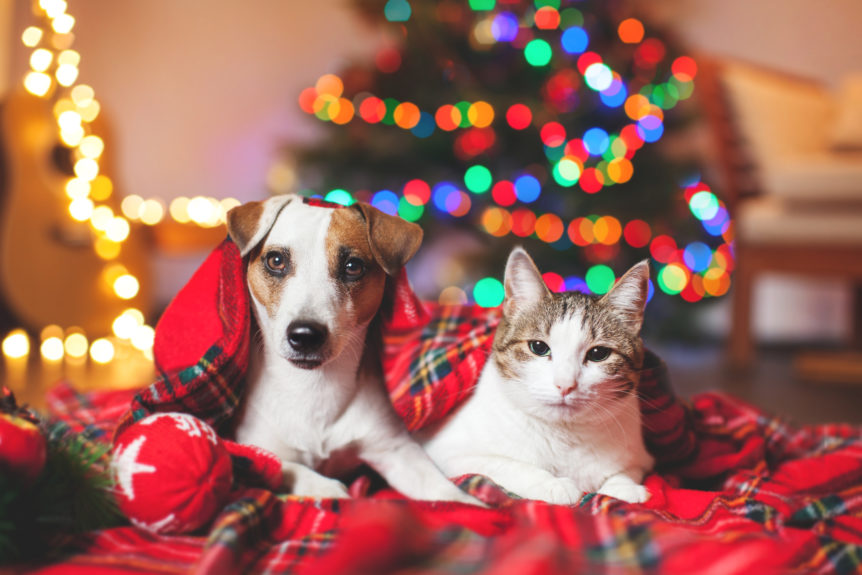The winter holiday season is upon us, and many pet parents plan to include their furry companions in the festivities. As you gear up for the holidays, it is essential to try to keep your pet’s eating and exercise habits as close to their routine as possible. Also, please be sure to steer pets clear of the following unhealthy treats, toxic plants, and dangerous decorations.
Christmas trees – Make sure your Christmas tree is securely anchored so it doesn’t fall over, especially if you have curious cats who like to climb the tree. Anchoring your tree will help keep tree water, which may have fertilizers or other harmful chemicals in it, from spilling. Stagnant tree water is also a breeding ground for bacteria. If your pet is allowed to drink it, they could suffer from nausea or diarrhea.
Mistletoe and holly – Avoid decorating with both of these plants during the holiday season. Holly, when eaten, can cause nausea, vomiting, and diarrhea. Mistletoe can cause gastrointestinal upset and cardiovascular problems. Many varieties of lilies can cause kidney failure in cats if ingested. Artificial plants made from silk or plastic are always a better safety bet for your furbabies.
Skip the tinsel – Cats love this sparkly, dangling decoration that is fun to bat around and easy to carry in their mouths. Unfortunately, it is all too easy for your cat to swallow strands of tinsel as well, which can lead to an obstructed digestive tract, severe vomiting, dehydration, and possibly require surgery.
Candles – Don’t leave lit candles unattended. Pets may burn themselves or cause a fire if they knock them over. Be sure to use proper candleholders placed on a stable surface.
Lights and electronics – Keep wires, batteries, and glass or plastic ornaments out of your pet’s reach. A wire can deliver a potentially lethal electrical shock, and a punctured battery can cause burns to the mouth and esophagus. At the same time, shards of breakable ornaments can damage your pet’s mouth and digestive tract. Unplug decorations while you’re not around. Cats, dogs, and other pets are often tempted to chew electrical cords.
A safe space – Give your pet his own quiet space to retreat to—complete with fresh water and a place to snuggle. Shy pups and cats might want to hide out under a piece of furniture, in their carrying case, or in a separate room away from the holiday activities.
Make sure you know how to get to your 24/7 emergency veterinary clinic before there’s an emergency. Talk with your veterinarian in advance to find out where you would need to take your pet and plan your travel route so you’re not trying to find your way when stressed. Always keep these numbers posted in an easy-to-find location in case of emergencies.


